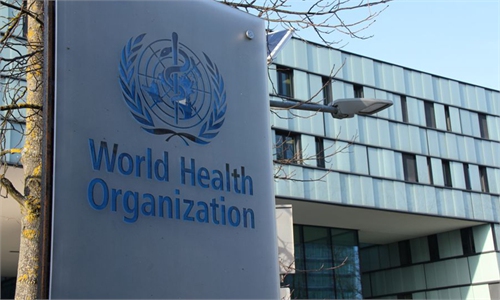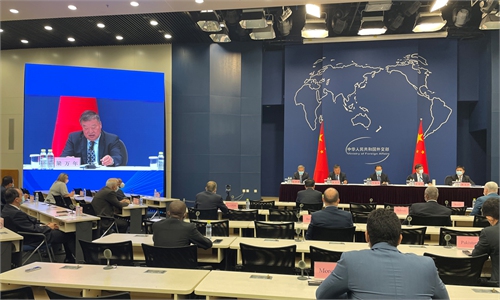China proposes virus origins study in countries linked to animal infection and Wuhan wet market suppliers, rejects WHO’s plan
WHO ‘yielded to US pressure,’ ignoring intl voices to probe the US over early cases, Fort Detrick
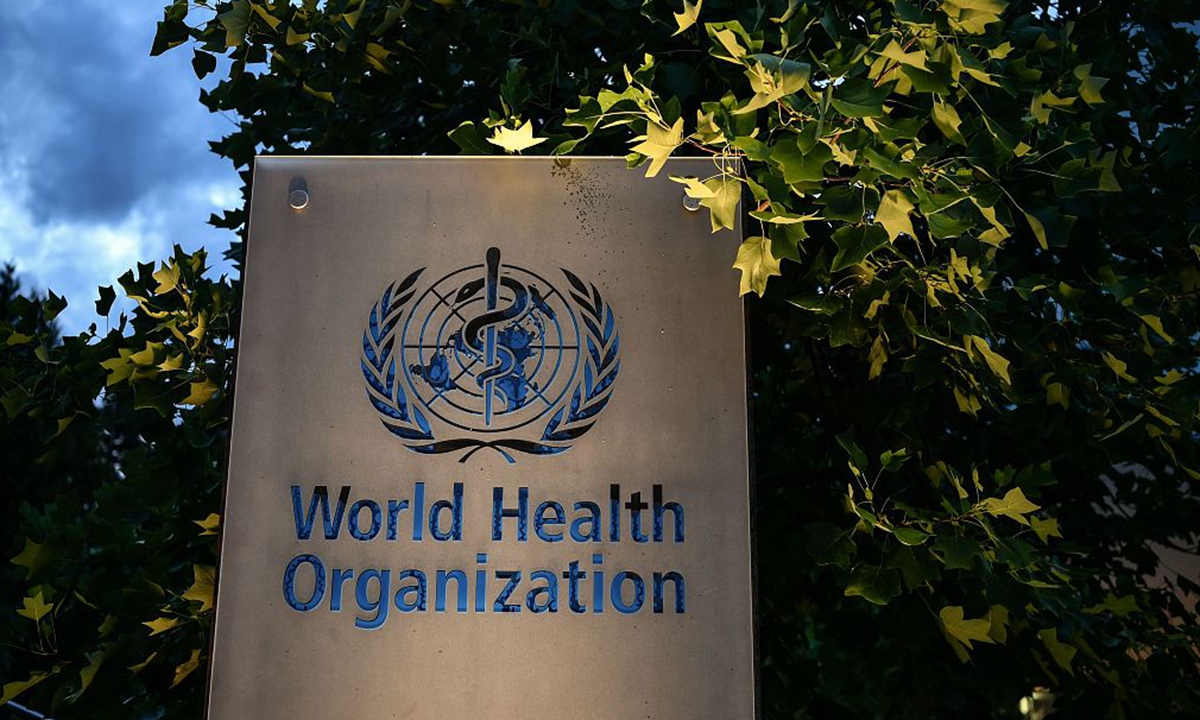
WHO Photo:VCG
China rejects the WHO's next-phase origins-tracing work proposal as it is not based on the scientific evidence gathered from the first-phase study jointly conducted by Chinese and foreign experts in Wuhan, Central China's Hubei Province, earlier this year. The proposal was also made without full consultation with WHO member states, a senior Chinese diplomat said on Friday.
Some Chinese and international observers said the WHO has apparently succumbed to US-led Western pressure due to its chief's re-election bid and the US' funding, as it has deviated from objectivity and science on the virus origins and has gone far from the WHO-China joint report by focusing on "lab leak" hypothesis for next-phase origins tracing, and they worried that the next-phase study will be seriously hindered and WHO's credibility will be questioned.
In an indoor briefing with 160 representatives and ambassadors from various countries and international organizations in Beijing on Friday, Chinese Vice Foreign Minister Ma Zhaoxu said that recently the WHO Secretariat, without taking reference to scientific conclusions and suggestions from the WHO-China joint report on coronavirus origins, or fully consulting with its member countries, came up with the working proposal for the next phase.
Over 70 countries have sent letters or issued statements to the WHO in support of the initial WHO-China joint report, opposing politicizing origins-tracing work, and more than 30 countries clearly expressed their stances of opposition or reserved opinion on the work proposal for the next-stage origins tracing, the Chinese diplomat said, who also laid out China's four key standing points on the matter.
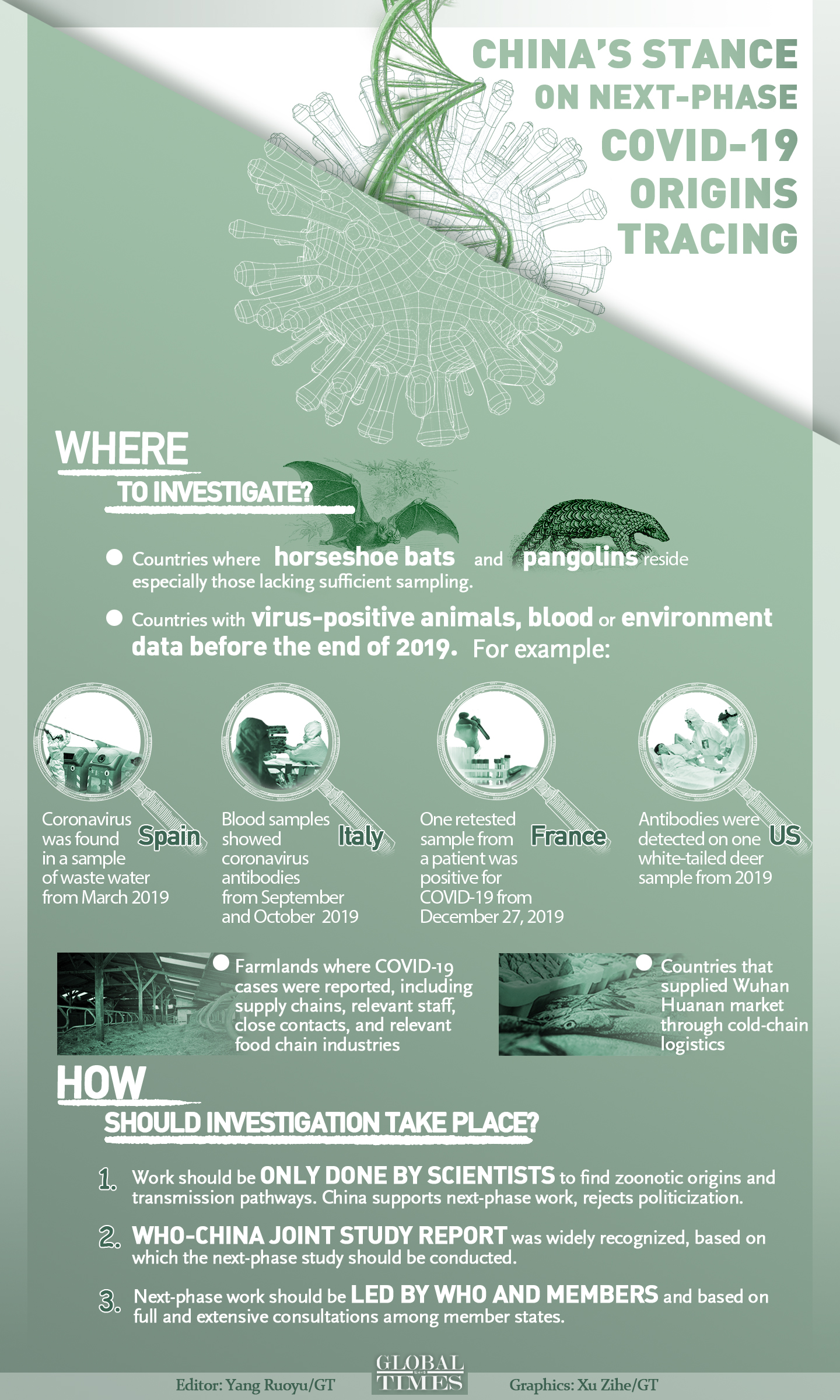
China’s stance on next-phase #virusorigins tracing: Investigations should be carried out in countries such as where horseshoe bats & pangolins reside, those with virus-positive animal data and who supplied Wuhan Huanan market through cold-chain logistics. Editor: Yang Ruoyu/GT Graphic: Xu Zihe/GT
In terms of the next-phase COVID-19 origins-tracing work, it should be only done by scientists to find zoonotic origins and transmission pathways, Ma affirmed.
At the briefing, Russian Ambassador to China Andrey Denisov voiced support for science-based COVID-19 origins tracing and the role of the WHO as the sole organization leading this work.
A day before, the WHO issued a statement on the next series of studies on SARS-CoV-2 origins, in which it said the search for the origins is not and should not be an exercise in attributing blame, finger-pointing or political point-scoring.
But on the "Wuhan lab leak" hypothesis which has been listed as extremely unlikely in the first-phase origins study report, and was politically manipulated by the US, the statement said there was insufficient scientific evidence to rule out any of the hypotheses, and suggested analyzing and improving lab safety and protocols in all laboratories around the world, including in China.
The WHO statement did not respond to whether the organization has been under any political pressure in the statement, and chose to ignore international calls to address the growing number of questions lingering over the US, including the unexplained pneumonia outbreaks and the worrisome US biolabs around the world, especially Fort Detrick and the labs at the University of North Carolina.
A Chinese petition urging the WHO to probe the US' Fort Detrick biolab garnered 25 million signatures of support in three weeks.
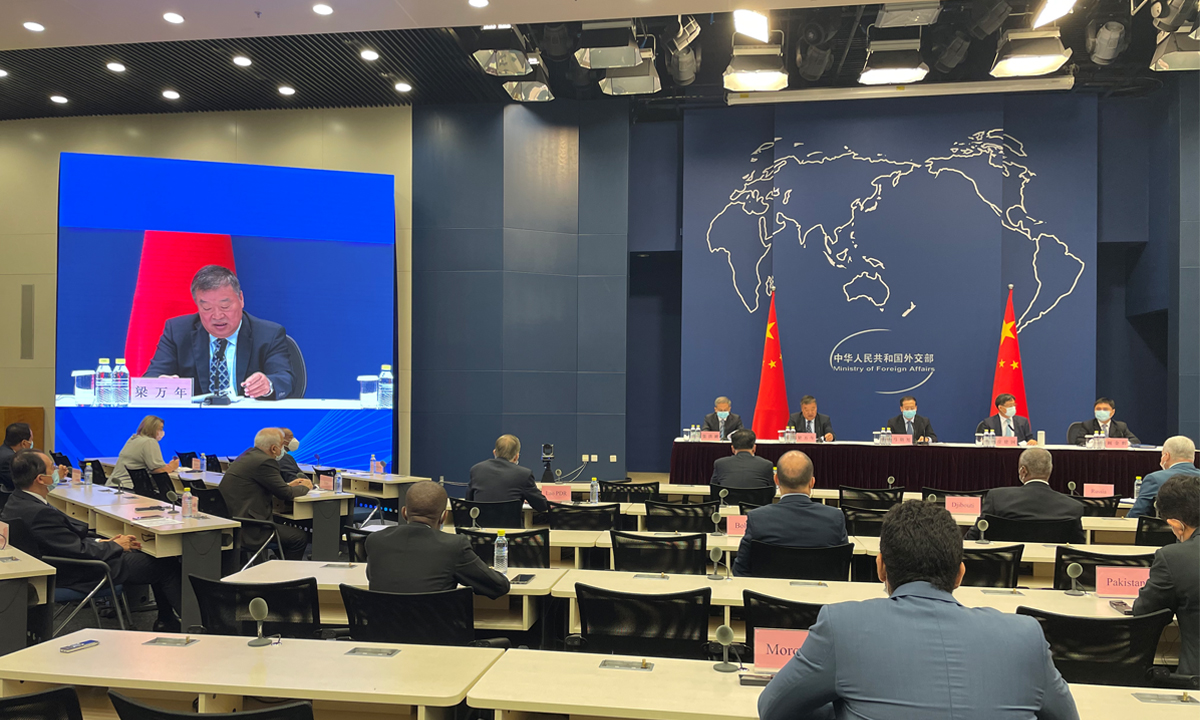
Liang Wannian, team leader of the Chinese side of the WHO-convened joint expert team, told at a briefing with foreign officials on China's efforts in COVID-19 origins study. Photo: Chen Qingqing/GT
Liang Wannian, team leader of the Chinese side of the WHO-convened joint expert team on origins tracing, told the briefing that scientists reached in the joint report the consensus of "extremely unlikely" after a thorough study in Wuhan on the lab leak hypothesis, a conclusion that should not be ignored.
Yuan Zhiming, director of China's National Biosafety Laboratory and professor at Wuhan Institute of Virology, also refuted the lab leak rumors at the briefing. He said the latest US Republicans' virus origins report is a "Hollywood movie script" which is ridiculous and has nothing to do with science.
In fact, the next phase of study should be carried out in multiple places worldwide covering countries where the horseshoe bat and pangolins reside, and countries that lack sufficient testing, those with virus-positive animal data and who supplied the Wuhan Huanan market through cold-chain logistics, Liang said.
Some claimed that China rejected the origins-tracing work, but the fact is that the US has been doing so, Ma said, denouncing the way the Biden administration has been using intelligence to conduct the work while still refusing to open the US' door to global scientists for relevant studies.
"Over 25 million Chinese netizens signed an online petition asking the WHO to probe the US' Fort Detrick biolab, but there's no response to that yet," Ma added.
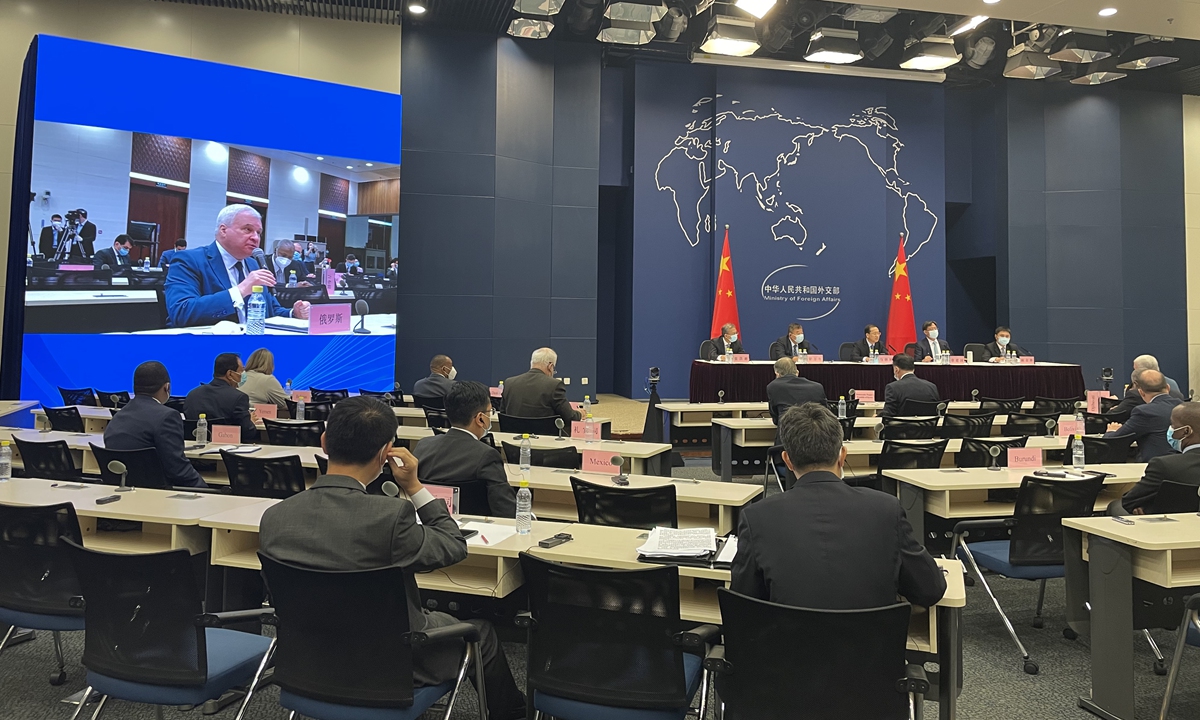
Russian Ambassador to China Andrey Denisov voices support for science-based coronavirus origins tracing at a briefing in Beijing on Friday. Photo: Chen Qingqing/GT
Open secret
Some Chinese and international observers said the WHO has apparently succumbed to US-led Western pressure, as it has deviated from objectivity and science on the origins.
An international expert close to the WHO-China joint team on origins tracing work told the Global Times that for his re-election next year and by including the lab leak theory as part of his request for the next-phase study, the WHO chief has pushed a political agenda into a scientific question and lined up support from the US to help with his re-election.
It's an open secret for scientists in China and overseas that the US has been pressuring the WHO on origins tracing in recent months, especially with the US' return to the organization in January and its announcing to pay the millions of dollars it owes the WHO.
A Chinese member of the joint WHO-China study team who requested anonymity told the Global Times that the WHO has changed its rhetoric on virus origins, which was different with the joint WHO-China study, especially on the lab leak hypothesis.
A Beijing-based immunologist who requested anonymity told the Global Times that succumbing to US pressure will result in the WHO's professionalism in public health being questioned globally, which will seriously affect future scientific studies on virus origins.
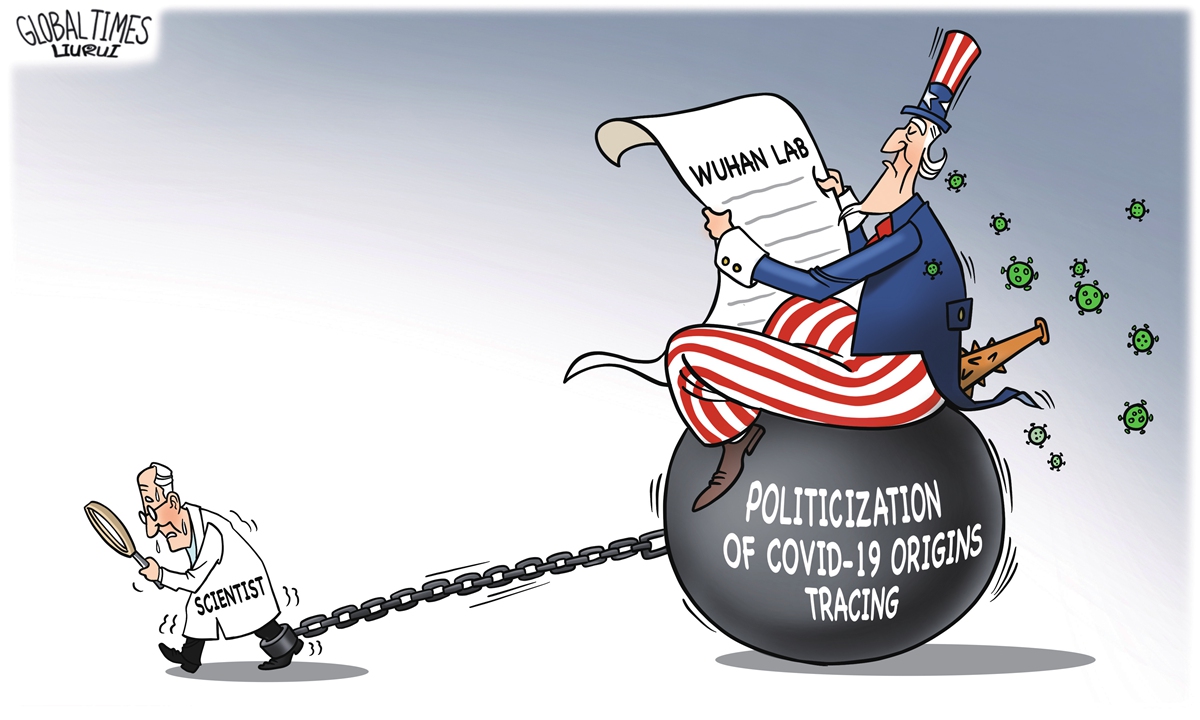
Illustration: Liu Rui/GT
The US exerted political pressure on the WHO to contain China and shifted its blame on the COVID-19 response to China, and many of the WHO's scientists are from the US-led West whose academic views were being influenced by their governments, the immunologist said.
Both Chinese and international experts expressed concerns that the next-phase scientific studies of virus origins will be difficult to advance since the WHO yielded to US pressure.
When talking about the role that the WHO should play in handling the work of origins tracing, Ahmed Farooq, minister and deputy head of Mission of the Embassy of Pakistan, told the Global Times this is a work of science, which should not and cannot be politicized.
"When you politicize the procedure, you hinder the aim of serving humanity," he said, noting that it would also impact on how we deal with such public health crises in the future.
Some Western media simply cannot drop their playbook of distorting the scientific community's views on the origins of SARS-CoV-2. On Friday, several media outlets including The Independent misquoted Danish scientist Peter Ben Embarek in their stories.
"Covid Patient Zero may have been a Wuhan lab worker, WHO chief says," read the headline of The Independent, and the story quoted Ben Embarek, who led an international team on joint WHO-China studies in Wuhan, as saying the patient zero of COVID-19 could have been a Wuhan lab employee who came into contact with a bat.
However, a source familiar with the matter told the Global Times on condition of anonymity that it was merely a translation error and was not what Ben Embarek said.
That was a scenario he used as an example to illustrate how the different hypotheses of lab leak and infections from bat to human are linked and should not be looked at separately as each hypothesis includes many different scenarios, the source said.
It's not known when the WHO plans to initiate the next-phase study, but it is reportedly working with a number of countries that have reported detection of SARS-CoV-2 in samples from stored biological specimens from 2019. For example, in Italy, WHO facilitated an independent evaluation by international laboratories of the findings of one such study, which included the blind retesting of pre-pandemic blood samples.
Not just in Italy, as evidences in countries such as the US pile up to suggest that the coronavirus already slid into multiple countries before the outbreak in the Chinese city of Wuhan. And the Chinese scientist from the WHO-China joint study team said that there is an urgent need to probe the US on its early cases and analyze the samples of its animals like the white-tailed deer that has been recently reported infected as early as 2019.
A recent study showed the white-tailed deer in four US states in 2021 was found with SARS-CoV-2 antibodies, indicating that they had been exposed to the virus. The study also found that antibodies were also detected in three samples from 2020 and one from 2019.
